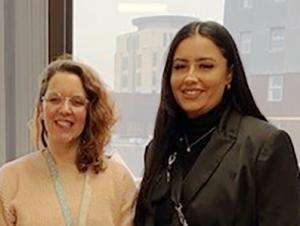'It made me want to be that voice that doesn't get heard'

Published by Professional Social Work magazine, 28 January, 2022
Care experienced young people spent a day shadowing social workers in Portsmouth to encourage them to consider careers in the profession.
All those taking part had shown an interest in becoming social workers under the drive which was part of the city’s Aspirations Week held every January.
One participant was 22-year-old Maria Black who shadowed children’s social worker Laura Dinning.
“I found it really interesting,” she said. “It made me realise this is definitely something I want to go into.
We went to the foyer, a hostel place for 18-25-year-olds struggling to maintain tenancy.
“The staff spoke about the processes and policies they have there and how they support their young people and the types of people who walk through the door.
“Afterwards we went to a residential home. I was surprised at how homely it was. I was expecting it to be really clinical.
“I spoke to a few of the key workers there, and they seemed so lovely, the type of people you would want to be around if you were in that situation.”
Currently in the first year of a social work degree at Portsmouth University, Maria’s journey into the profession stemmed from a realisation that she wanted to care and support other people.
“Previously I was doing jobs where I was office-based. I was basically picking up the phone and answering queries. I realised I wasn’t really enjoying it and then started a care job and realised how much I want to keep people safe and look after them.
“Supporting people with their problems - I just found that so rewarding. I spoke to my social worker about it who said, ‘Why don’t you be a social worker? You are an expert of your own past and have had a lot of involvement with social workers’.
“So I threw myself into an access course and the more I learned about psychology, sociology and criminology, about all the different factors that make someone disadvantaged, and how much support people need - it kind of made me want to be that person for them, be that voice that doesn’t get heard.”

Maria said experiencing social work from the other side has given her insight into her own time in foster care.
“It helped me realise when I was with my social workers why they couldn’t do certain things, or why it took so long. It gave me an understanding to my own situation.
“I understand that they are guided by legislation and they can’t always do what they want to do through that.
“But when you are younger you fall into the trap of the stereotypes of a social worker. Hearing about all the different parts of what they do and how they support someone opened up my eyes to how much support is out there for someone.”
Maria said spending the day shadowing also underlined the struggles faced by some groups and individuals within society.
“I realise how privileged I am despite my circumstances. You have a different perspective on people. You can be very small-minded before you learn about how someone’s brain works, how their environment can impact on them and how society can impact on a certain group or person.
“It just changes your outlook on people. Normally you might see someone who is angry and before my initial thought would have been different.
“Now I have my problem-solving brain on and ask ‘Why is that person angry, what has made that person angry, how can we help that person?’. I am not seeing anger, I am seeing frustration. I look at it differently now.”
As a practising social worker, Laura said she gained a lot from the day too. She believes it's crucial that social workers connect with the profession's education. “I love meeting with the next generation of social workers.
“Maria totally tested me on theories and approaches. She had loads of really insightful questions. I like connecting back with students who are in those first three years of learning, not only to remind myself of what I went through but also to see the up-and-coming social workers and what has changed in their education. And then get tested and reminded about what you do in practice and why. That is really easy to forget when you are on the ground.
“It reminded me why I love my job as well. I said to Maria sometimes you don’t want to write that assessment or sit at the computer, that’s not why people come into social work.
“But connecting back with young people and students it reminds you why you do it and of the good bits...”
